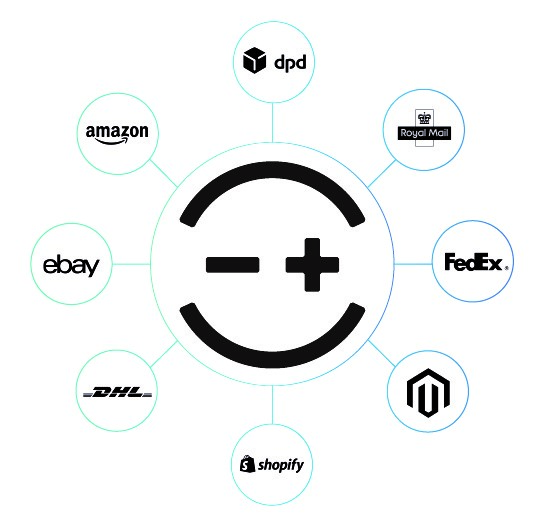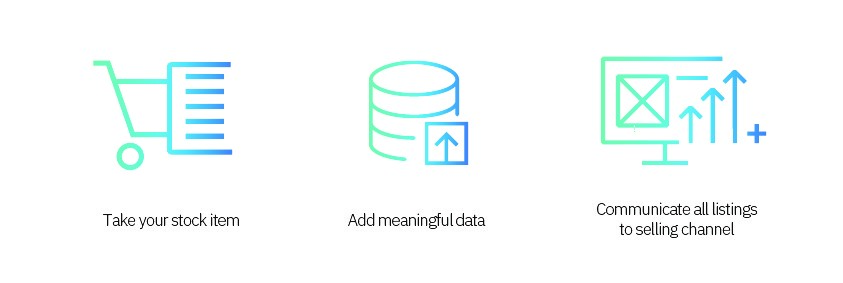
Choosing the Right Inventory Management System for Your Business
Editor’s Note: This is a guest post written by Chloe Wilcox, UK Partner Marketing Manager at Linnworks.
When it comes to improving your selling processes and scaling your online business, one of the first things to do is implement an inventory management system. Problem is, there are many options available and making the best choice can feel like a difficult decision.
So, how do you choose the right inventory management system for your online store?
In this article, we shine a spotlight on everything you need to consider to choose the best inventory management software to support your long-term business goals.
Consider Your Needs, Goals and Capabilities
First, it’s important to think about your core business goals and future growth ambitions. Thinking both long-term and short-term is key, as otherwise you risk ending up with a solution that you quickly outgrow or run into problems with.
So, what business goals are supported with modern inventory management?
- Increase business profitability (e.g. accurate stock control)
- Market expansion (e.g. sell across more countries and platforms)
- Increase efficiency (e.g. automation of processes)
- Reduce business costs (e.g. save on additional staffing)
- Boost customer satisfaction (e.g. faster order fulfilment)
- Strengthen relationships with suppliers (e.g. communicate reorder points)
Next, you’ll want to consider the current state of your business. Having insight into your current order volume and predicted growth rate will help inform your business goals.
Ask yourself the following:
- How many monthly orders do you receive?
- What’s your projected growth over the next two years?
- How many products do you sell?
- Do your products require multiple variations or bundling functionality?
- Do your products make use of expiration dates?
- Which online marketplaces and eCommerce platforms do you sell on?
- What shipping aggregators and courier services do you use?
- Do you have any immediate plans to integrate with specific platforms?
While both areas will help narrow down your search for the right inventory management software, it also makes good sense to assess your current capabilities.
After all, understanding your capacity and expertise will help you to make the most sustainable decision for your business – saving you time and money in the long run.
There are three key capabilities that are worth paying attention to:


Capability #1: Time
How much time can you afford to implement your solution?
Most modern inventory management systems can be complex in nature and as such can take plenty of time to set up correctly. Additionally, the number of products and platforms you sell across can impact how quickly your system becomes ready to use. Once up and running however, they become time-saving lifelines for online businesses.
Capability #2: Money
Your available budget will play a key role in determining the best inventory management software for your business.
While this type of solution can vary in cost, it’s important to consider any software’s scalability capabilities to make sure they’re in line with your projected rate of growth. You’ll end up losing more money if you outgrow your chosen system too quickly and must migrate.
Capability #3: Expertise
Do you have enough knowledge on your team to implement inventory management software or will you need to budget for a third-party developer?
The most effective inventory management software is robust and complex, making the implementation process technical and time-consuming.
If you don’t have the right expertise on your team but do have the time and drive to learn, then you’ll need to consider what resources are offered by the software provider. For example, will you have access to documentation, and can you understand the language used in this content? What methods of customer support are provided? Are there installation and integration videos available?
Your level of expertise will also guide your choice in terms of the usability of inventory management software. If you don’t have much technical knowledge and complex systems seem daunting to you, then you’ll need to look for simple, user-intuitive solutions.
Essential Inventory Management Software Features
Centralization of orders
One of the core functions of inventory management software is the centralization of orders. Regardless of the online marketplace or website platform you sell on, you’ll be able to maintain control of your inventory always.
Think of your system as being the central hub to your online business.


An effective inventory management solution will collate your selling channels and other integrations (e.g. shipping couriers) together into one location – meaning you no longer need to log in separately to every single sales channel.
Stock control
Having complete visibility of your stock levels and stock movements saves you time, reduces business costs and boosts your overall efficiency. As such, your inventory management system should:
- Allow you to track stock quantity, value and movements.
- Automatically update and synchronize your stock levels across your sales channels to prevent stock outs and overselling.
- Ensure the traceability of your stock.
- Use batch tracking functionality for greater oversight of your inventory and so that you can track exactly which items you sold and to whom.
- View the complete history of your stock movements within your warehouses so you can resolve stock discrepancies quickly and efficiently.
Listing management


An automated inventory management system should provide you with advanced listing management functionality to reduce your workload and give you greater clarity and control over your business. Specific features include:
- Bulk listing to help eliminate manual data entry and speed up your processes by allowing you to create listings in seconds. You should be able to set and revise channel-specific prices, titles and product descriptions easily with this feature.
- A data import tool which will make use of default titles, images and attributes that the system then automatically communicates to each selling channel on your behalf.
- Oversight management to be able to see which product listings are live, in a queue or unpublished.
- Multi-variation and bundling functionality to help cut back on costs and increase order value.
- Expiry date tracking functionality to ensure items with the most imminent sell by dates are sold first.
Order management
How quickly and accurately you process and fulfil orders has a big impact on your bottom line. Your inventory management software is integral to streamlining this process. When comparing solutions, ensure that the inventory management system:
- Automates processing elements, including order creation, label printing and order fulfilment.
- Communicates with selling channels and courier integrations in order to speed up order fulfilment. For instance, a good system will allow you to assign shipping providers, notify them, split orders and add tracking information quickly.
- Prioritizes orders based on a variety of factors, including destination, order date, delivery method, courier service, inventory location and more.
- Offers barcode scanning functionality for order picking accuracy, greatly reducing human error.
- Can automate tax calculations, especially if your selling across multiple countries.
- Can process returns and refunds efficiently. Some inventory management systems allow you to assign reasons for returns, which can help inform future business decisions and strategies.
Shipping management
An inventory management system can help alleviate many shipping issues, including late dispatches or marketplace account suspensions due to delayed order fulfillment. This can be done using:
- Automatic shipping updates and the bulk printing of shipping labels, picking lists, invoices and packing slips.
- Advanced tools that compare shipping services from a range of international and domestic couriers.
- A business rules engine that develops, stores, edits and implements business rules. Often, these are logical statements that define the behavior and operations of a business. This enables you to apply bespoke shipping rules to your orders, such as the automatic allocation of courier services based on specific conditions, including:
- Weight
- Dimensions
- Value
- Channel
- Destination
Finally, if you use (or plan to use) fulfillment centers or dropshippers, then you will need to ensure that your system has the capacity to assign orders to specific locations.
Integrations
You’ll need to verify that your inventory management software integrates with all your selling channels and couriers – and hopefully many more. Even if you are only selling on a few marketplaces, it makes good business sense to think about the long-term and consider channels that may be a good fit for you in the future.
Ultimately, a robust inventory management system will integrate with hundreds of online marketplaces, eCommerce platforms and shipping couriers.
Long-Term Inventory Management Software Considerations
Reporting and analytics
Before we go any further, it’s worth clarifying that reporting and analytics are two distinct forms of business intelligence used to inform decisions, as illustrated in the video below:
One of the biggest advantages to implementing such a solution is that it should enable you to view your historical sales data. This allows you to identify buying patterns and seasonal trends while increasing the accuracy of demand forecasting.
A good system will also be able to help you quickly see both your strongest and weakest sales channels and products so that you can make more informed decisions to boost your bottom line.
Finally, you may want to seek out a solution that can provide straightforward insight into your stock tables, shipping reports and cashflow analysis.
Of course, it’s worth knowing that some inventory management systems go one step further and offer their own advanced analytics tools as an add-on for when your business has grown, and your team has enough technical knowledge.
Scalability
To ensure maximum return on investment from your inventory management system, you’ll need to assess its scalability. After all, switching between multiple solutions as you grow will eat away at your overall profits.
With regards to scalability, make sure you consider:
- Integrations – Look for inventory management software that provides hundreds of integrations with eCommerce platforms, marketplaces, courier services, shipping aggregators and has many more on the roadmap to ensure that you’ll be able to expand with minimum disruption.
- Customization – Every business is different, and you’ll need to be able to adapt the system to meet your needs.
- Speed – Look for systems that can guarantee lightning fast performance and zero downtime.
In addition, we suggest quizzing the solutions you’re comparing on how they monitor their software to proactively react to events before they have any impact on your data, your system and your overall business operations.
You may also want to look out for a variety of advanced features, such as:
- Expert-level analytics (e.g. Pivotal Analytics, which requires deep knowledge)
- Multiple warehouse locations (e.g. support international expansion)
- Multiple bin locations (e.g. maximise efficiency of warehouse and order fulfilment)
Finally, looking out for open API architecture will pay big dividends in the long run as you can create custom integrations for more obscure selling channels or couriers – enabling you to build the exact business you imagined.
Customer service
While assessing functionality is of prime importance when choosing inventory management software, assessing the quality of customer service is also key.
Ask yourself the following:
- How much technical knowledge do you have on your team?
- Will you be using a third-party to support you or going it alone with your team?
- How much support do you foresee needing to set your system up successfully?
- What’s your preferred method of communication for customer service issues?
- Do your working hours conflict with that of your chosen software provider?
Online review websites can provide insight into how good a company’s support offering is. Failing this, you could ask to speak directly to current customers of each system to get a better understanding of the quality of support available.
Supporting content
Most inventory management systems are complex and can take some time to get used to. That’s why it’s important to assess the quality of supporting content available to you.
For example, are you knowledgeable enough to understand any accompanying technical documentation? Or will you need to use a third-party?
Are there videos to help you set up your software? And again, do you understand the language used to create an error-free inventory management system?
Although not imperative, another aspect that might be of some benefit to your business is if your chosen inventory management provider facilitates face-to-face meet-ups to help you get maximum value out of your system and share business growth insights.
Are You an Ideal Candidate for Inventory Management Software?
While businesses of all sizes can benefit from the right inventory management software, there are general criteria that you’ll need to check off to ensure that you’ll get maximum value out of your system.
Here are some quick questions worth checking over with your team:
- Do you sell online already or plan to sell online?
- Do you sell on two or more channels?
- Do you plan on expanding to additional channels/markets?
- Are you reaching a ceiling with your manual processes?
- Do you benefit from a steady flow of orders each month to justify the investment?
- Do you need more time to focus on business growth strategies?
An ideal solution will support your continued growth for at least three to five years – if not forever – so that you can ensure a solid return on investment.
Invest in the Right Software from the Start
Ultimately, the best inventory management software will put you leaps and bounds ahead of your competition by maximizing the efficiency of your daily selling processes and increasing your overall profitability so that you can focus on growing your business.
While it can be tempting to go for the cheapest solution, making an investment for the system that fits your needs will serve you much better in the long-term, helping you build the business you imagined.






